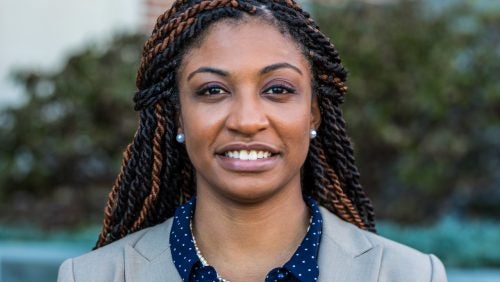My Clinic Win: Advocating for Prisoners’ Rights with the Civil Rights Clinic
October 9, 2025

Rio Dennis, B’25, L’25, took part in the Civil Rights Clinic during her 3L year.
Rio Dennis, B’25, L’25, enrolled in Georgetown’s joint J.D./M.B.A. program to explore her interests in business, law and public interest work, and to perhaps carve out a career incorporating all three.
During her 3L year, Dennis took part in the Civil Rights Clinic, where students represent individuals and organizations in cases spanning a range of civil rights issues, from voting rights and employment discrimination to police brutality.
Now a judicial clerk on the United States District Court for the District of Maryland, Dennis reflects on advocating on behalf of an incarcerated client, the process of filing a complaint in federal court and the value of gaining litigation experience as a law student:
“I worked with my clinic teammates Laila Ahmed, L’25, Sophie Gelber, L’25, and Douglas Wickham, L’25 on behalf of our client, Jaeon Chavis, to file a complaint against five Virginia corrections officers who he said kneeled on his neck and back for a prolonged period, put him in a chokehold, maced him and released a canine on him. He continues to suffer from permanent damage to his leg and ongoing emotional trauma.
The clinic took on Mr. Chavis’s case starting in fall 2024. That semester, the team did a lot of the fact-gathering and interviews, including driving eight hours to Wallens Ridge State Prison in Virginia, to create a detailed account of what happened. In the spring, we focused on legal research and exploring different arguments to establish that our client’s rights were violated in the attack. In March, we filed our complaint in the U.S. District Court for the Western District of Virginia.
One major challenge was navigating the Prison Litigation Reform Act (PLRA), which makes it very difficult for incarcerated individuals to bring lawsuits. Mr. Chavis had originally filed his grievances pro se [on his own behalf, without an attorney], which helped preserve his claims. But part of what we learned is how many people never make it to court simply because of how complex this process is.
Our final complaint included six legal claims, including that Mr. Chavis’s rights were violated under the First and Eighth Amendments, as well as Virginia state law. Because we worked with local counsel on the case, we had to coordinate closely and sometimes revise our theories based on their input. But our clinic supervisors encouraged us to take the lead on our arguments. If we believed a claim was strong and had the research to support it, they trusted us to advocate for it.
Each of us wrote our own version of the introduction to the complaint, and then we pulled pieces from each one to form a cohesive draft. For the claims, each teammate took the lead on one and partnered with another to double-check it. In the final days, we spent about 15 hours in a room together, going line-by-line through the complaint to get it ready to file — it was a true incorporation of everyone’s work by the end.
Participating in the clinic exceeded all of my expectations. During 1L and 2L classes we learn how to do legal research and writing and about the theories behind different areas of the law. But in clinic, I had the chance to work on different parts of litigation and to apply those skills first-hand, whether I was having trauma-informed lawyering conversations, reviewing discovery documents or writing the complaint itself.
It has also been heartwarming to work with a client who is so interested in the law and in advocating for justice for himself and others. The whole time we worked together, Mr. Chavis remained very engaged in helping to research and advocate for himself — he even has a website where he posts updates about his case.
I came into this experience knowing that I wanted to go into litigation long term, but being very nervous about the potential impact my work would have on a client’s rights and their access to justice. Through the clinic and through the support of the supervising attorneys, I feel a lot more confident about my ability to be a lawyer after law school. This fall, a new team of students is picking up the case and has initiated the process of discovery, and I continue to watch it closely.”
Georgetown Law offers the country’s largest and most highly regarded clinical education program: every year, more than 300 students participate in our 17 different clinics. Under the supervision of faculty and fellows, they have the opportunity to engage in real-life lawyering. In this series, students share their “clinic wins” — the large and small accomplishments that came through their clinic experiences.